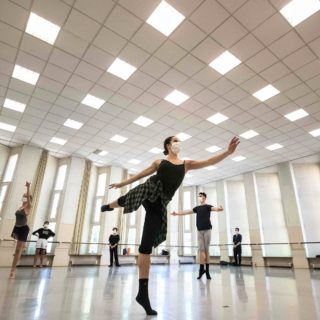IN 2021, THE year after China overtook America to become the world’s largest film market, “The Battle at Lake Changjin” became the highest-grossing film in Chinese history, and the second-highest of the year worldwide. It made over $900m, just behind “Spider-Man: No Way Home”.
The eponymous battle took place in 1950 during the Korean war and saw Mao Zedong’s army inflict a heavy defeat on America. The film, which was directed by Chen Kaige, a leading light of the “fifth generation” of film-makers who sprang to global prominence in the 1980s, has been especially popular among young Chinese. Social-media users have posted gushing reviews. Fans posted videos of themselves eating frozen potatoes and fried flour, like the soldiers in the film, in tribute to the hardships of that generation.
But the film is important for another reason. It was made in close co-operation with the Communist Party’s propaganda organs. All films in China must pass party censors, but until recently, it has been market-driven comedies and dramas that have been most popular. Films specifically aimed at drumming up support for the party have been notable for their dullness. In 2009 “The Founding of a Republic” was the first of a trilogy released for the 60th anniversary of the founding of Communist China. It was such a flop that Douban, a film-rating website, disabled voting. Now, after a decade of collaborating with serious film-makers, the party has worked out how to make propaganda more like entertainment that people actually want to watch.
The government still corrals audiences and limits choice. In 2021, to celebrate the 100th anniversary of the party, it ordered every cinema in the country to schedule at least two screenings each week of films that are “patriotic” (and which, as usual, conflate patriotism with support for the party). Full houses were ensured by bringing in officials and party members and by discounting ticket prices, according to a policy directive. For “The Battle at Lake Changjin”, schools booked out cinemas for their pupils. A Chinese journalist famous for his investigations into official corruption was detained after he criticised it.
But such measures are now needed less. Patriotic films and television shows, known in Chinese as zhu xuanlu—“main-melody” films—often score hundreds of thousands of high ratings on Douban. A nationalistic flick from 2017, “Wolf Warrior 2”, ranked higher than two-thirds of other action films. Almost half of all viewers of the 45 new “main-melody” television shows in the first ten months of 2021 were aged 18-24, says Endata, a research firm.
The party wants to build on these successes. In November the China Film Administration, which determines whether, when and how a film is released, published a new five-year plan for 2021-25. China will become a “strong film power” by routinely releasing “masterpieces that manifest Chinese spirit, values, power and aesthetics”, it said. This will require the country to release “ten major films” each year that are “critically acclaimed and popular” and 50 that make 100m yuan ($16m) or more. Domestic films should account for over 55% of total annual box-office receipts.
This should be easy. Local titles accounted for 89% of releases in 2021, according to Dengta, an online-ticketing platform. The country, which had just 2,600 screens in 2005, now has 82,000 (twice as many as America, where the number has not grown for a decade). So patriotic films are likely to grow in number.
Historical films generated around 15% of ticket sales in 2020 and 2021, up from 1-2% in the preceding several years, according to Dengta. Main-melody films dominated discussions in forums at both the Beijing and Shanghai International Film Festivals in 2021. Government support seems bottomless. “The Battle at Lake Changjin”, like many such flicks, was subsidised out of a special fund that takes 5% of national box-office revenues and redistributes them to domestically made films.
The casting of some of China’s most famous film stars, spanning several generations, helps. Many of the most popular young actors and musicians also serve as faces of the party. Jackson Yee, who starred in “The Battle at Lake Changjin”, is one of China’s hottest celebrities. Originally a boy-band member, he has the sort of androgynous appeal the party has, in other contexts, recently condemned as “abnormal”. But he is also a standing-committee member of the national student union, which is controlled by the Communist Youth League, a branch of the party. A hashtag promoting Mr Yee’s role in “The Battle at Lake Changjin” has been viewed almost 13bn times on Weibo, a microblog.
To clear the way for flag-waving local fare, China keeps out most American films. A quota system allows up to 34 Hollywood movies to be screened in theatres each year. In 2021 only 19 were permitted. Worsening tensions between America and China, coupled with the pandemic, which has made China more insular, may explain the reduction. The authorities often hold up foreign blockbusters for months to help a domestic rival sell more tickets.
Films from Marvel Studios, owned by Disney, have had a particularly rough time. No Marvel titles were approved in 2021, no matter how hard they tried to avoid upsetting censors. Not even “Shang-chi and the Legend of the Ten Rings”, a superhero film set in China, made it. The party may have punished Marvel after nationalist trolls dug up remarks that were critical of China, made by the film’s Chinese-born star, Simu Liu. The same happened with Chloé Zhao, the Beijing-born director of “Eternals”, whose previous film, “Nomad land”, was banned as a result.

It is not just Hollywood; flicks from anywhere foreign are being squeezed out (see chart). Only 11% of films released in 2021 were imported. Political tensions have stymied the release of movies from India, South Korea and Japan.
A boom in genuinely popular patriotic television shows is also under way. A 23-part series called “Min Ning Town”, chronicling the party’s poverty-alleviation programme, scored 9.2 out of 10 on Douban, outranking “The Queen’s Gambit”, a Netflix series about chess. The “Age of Awakening”, about the founding of the party, made with the support of propaganda organs, was another of the most popular television shows in 2021, scoring 9.3 on Douban among almost 400,000 voters. Many viewers were surprised by the quality of such “red thematic” dramas, as the genre is known.
Wherever there is culture, the party is getting more involved, especially if there is a chance to win the loyalty of the young. In November, a few weeks after a Chinese team won the world championship for League of Legends, a video game, one of its members, Ming Kai, joined the party. Official podcasts, such as a recent series on party history, now sound as well produced as their viral American rivals. And the party is getting into larping—“live action role-playing”—in which enthusiasts don costumes and act out scripts in a fantasy world. People in China spent an estimated $2.7bn on the fad in 2021. Authorities are promoting patriotic scripts about the Sino-Japanese war instead of the usual murder mysteries. Never has party propaganda been so frighteningly attractive.
By The Economist





